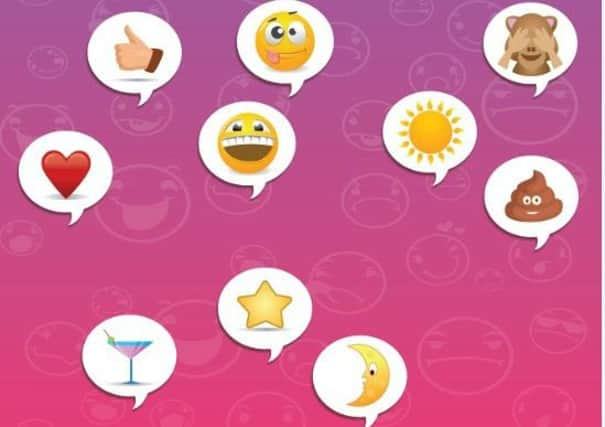Brits now use more emojis than words in texts


Over half the nation (63%) admits to using the symbols rather than words in text every day – with the most popular being a pile of poo, aubergine and See-No-Evil monkey emoji.
Emojis have been around since the 1990s and Apple first included them in its iPhone keyboard in 2011.
Advertisement
Hide AdAdvertisement
Hide AdAhead of the Emoji movie launch, the poll of 1,000 people by Mecca Bingo found the key moments emojis are used are to represent a hangover (18.1%), embarrassment (17.2%), excitement (16%) and sarcasm (16%).
This war on words has resulted in emojis now taking over the way we visually represent our feelings, with just over a third of Brits admitting they’d be happy to see emojis replace words altogether.
It seems a picture really does paint a thousand words, with Brits using the poo emoji to be cheekier (16%) and the aubergine emoji (5%) to be more flirty than we might be brave enough to do in words.
When asked to pick the top five moments emojis work better than words, Brits voted as follows:
1. The nauseated face to show we are hung-over (18%)
2. The See-No-Evil monkey to show embarrassment (17.2%)
Advertisement
Hide AdAdvertisement
Hide Ad3. The woman dancing to show you’re ready for a night out (16.7%)
4. The side eyes to mock something (16.5%)
5. The pile of poo to be cheeky (16.1%)
Mecca Bingo, which has its own exclusive range of Emoji Bingo games, is celebrating the launch of the Emoji Movie to highlight how the tiny symbols have become part of everyday language for millions of people around the world – even replacing bingo balls and numbers!
Those who took part in the poll also highlighted the top 10 emojis used on a daily basis:
1. Happy face
2. Heart
3. Crying laughter
4. Poo
5. Love eyes
6. Monkey
7. Winking face
8. Tongue out
9. Thumbs up
10. Aubergine
With emojis being used more regularly in everyday life, other top moments emojis work better than words included announcing if you’re having a boy or a girl (50%), and a further 50% also said they’d be happy for them to be used to report on programmes such as the weather.
Advertisement
Hide AdAdvertisement
Hide AdThe moments we most definitely won’t see the emoji craze takeover include more formal situations such as the doctors, with 77% disagreeing with the use of them for reporting on anything medical, 52.7% also disagreed with them being used on CVs and 49.3% admitted they wouldn’t be happy seeing them on the news.
Caroline Webb, spokesperson for Mecca Bingo, said: “It seems emojis really do speak louder than words, from using them to flirt, to having their own game of bingo and even featuring in the latest blockbuster.
“They are a great way to represent emotions and who knows in the future maybe we’ll even see them replacing words in the dictionary!”